#chat gpt app developer
Explore tagged Tumblr posts
Text
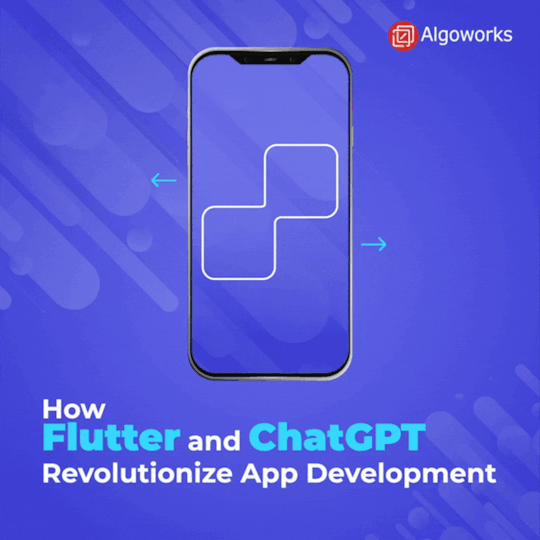

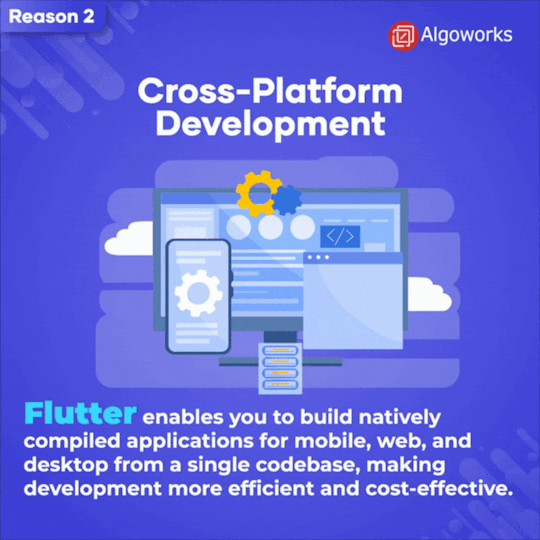
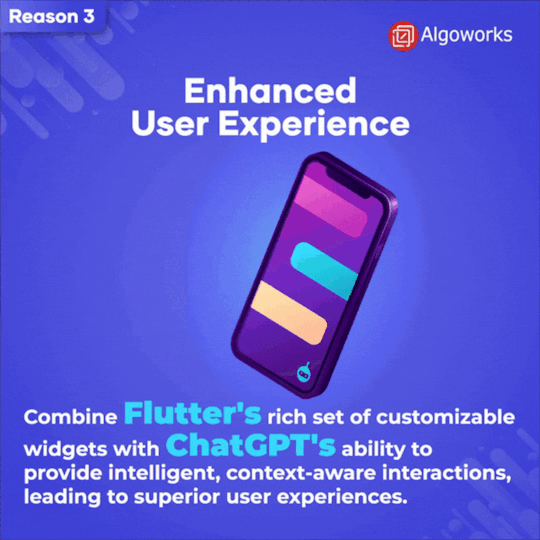

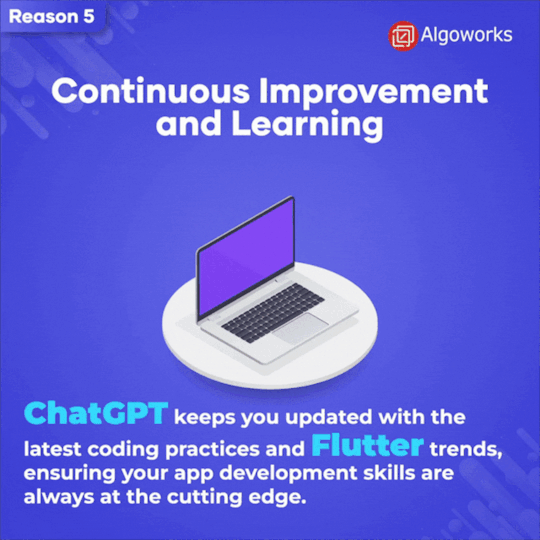
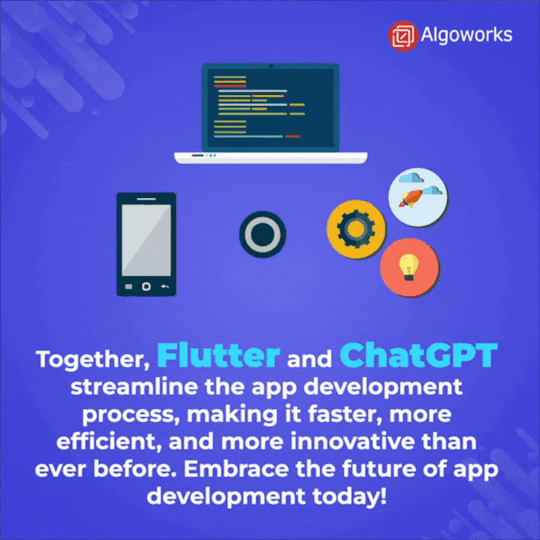
Imagine building sleek, powerful apps with ease. That’s what Flutter brings to the table!
Add ChatGPT to the mix, and you've got an intelligent assistant that helps you code faster, solve problems, and bring your ideas to life in record time.
Say goodbye to tedious coding and hello to the future of app development!
2 notes
·
View notes
Text
Using ChatGPT for mobile application development offers myriad advantages. It streamlines the development process by providing insightful suggestions, enhancing user experience, and optimizing functionality. Its versatile nature allows for personalized interactions, efficient problem-solving, and seamless integration of features. Additionally, ChatGPT accelerates development cycles, reduces costs, and ensures high-quality outcomes, making it an indispensable tool for modern mobile app development endeavors.
#chat gpt for mobile application#chatgpt mobile app development#mobile app development using chat gpt
2 notes
·
View notes
Text
Something I don't think we talk enough about in discussions surrounding AI is the loss of perseverance.
I have a friend who works in education and he told me about how he was working with a small group of HS students to develop a new school sports chant. This was a very daunting task for the group, in large part because many had learning disabilities related to reading and writing, so coming up with a catchy, hard-hitting, probably rhyming, poetry-esque piece of collaborative writing felt like something outside of their skill range. But it wasn't! I knew that, he knew that, and he worked damn hard to convince the kids of that too. Even if the end result was terrible (by someone else's standards), we knew they had it in them to complete the piece and feel super proud of their creation.
Fast-forward a few days and he reports back that yes they have a chant now... but it's 99% AI. It was made by Chat-GPT. Once the kids realized they could just ask the bot to do the hard thing for them - and do it "better" than they (supposedly) ever could - that's the only route they were willing to take. It was either use Chat-GPT or don't do it at all. And I was just so devastated to hear this because Jesus Christ, struggling is important. Of course most 14-18 year olds aren't going to see the merit of that, let alone understand why that process (attempting something new and challenging) is more valuable than the end result (a "good" chant), but as adults we all have a responsibility to coach them through that messy process. Except that's become damn near impossible with an Instantly Do The Thing app in everyone's pocket. Yes, AI is fucking awful because of plagiarism and misinformation and the environmental impact, but it's also keeping people - particularly young people - from developing perseverance. It's not just important that you learn to write your own stuff because of intellectual agency, but because writing is hard and it's crucial that you learn how to persevere through doing hard things.
Write a shitty poem. Write an essay where half the textual 'evidence' doesn't track. Write an awkward as fuck email with an equally embarrassing typo. Every time you do you're not just developing that particular skill, you're also learning that you did something badly and the world didn't end. You can get through things! You can get through challenging things! Not everything in life has to be perfect but you know what? You'll only improve at the challenging stuff if you do a whole lot of it badly first. The ability to say, "I didn't think I could do that but I did it anyway. It's not great, but I did it," is SO IMPORTANT for developing confidence across the board, not just in these specific tasks.
Idk I'm just really worried about kids having to grow up in a world where (for a variety of reasons beyond just AI) they're not given the chance to struggle through new and challenging things like we used to.
38K notes
·
View notes
Text

🧠 AI-Powered Software Development by CQLsys Technologies Revolutionize Your Development Process — Responsibly and Intelligently
At CQLsys Technologies, we go beyond code to deliver next-gen AI-driven software development solutions that speed up your workflows, enhance accuracy, and reduce costs — all while keeping security, ethics, and compliance at the forefront.
✅ What We Offer:
AI-assisted Code Generation & Optimization
Smart Testing with AI-based QA Tools
Predictive DevOps & Automated Deployment
Retail AI Integration, RPA Solutions & Computer Vision Implementation
Custom AI Chatbots and NLP Tools
Secure, Explainable, and Scalable AI Models
🔐 We also help businesses mitigate the risks of AI integration: from bias and over-dependence to data privacy and compliance challenges.
📈 Whether you're a startup or an enterprise, our AI-infused development services are built to future-proof your digital solutions.
💬 Ready to Build Smarter with AI? Talk to our AI development experts today. 🌐 Visit: https://www.cqlsys.com
#ai chat bot for website#ai chat bot free#ai chat bot online#ai chat online free#ai open chat#ai talking#ai chat website#taxi software#best food delivery app development company#ai gpt chat
0 notes
Text
ChatGPT and AI: Transforming IT Services for a Smarter Tomorrow

In the realm of IT services, staying ahead of the curve isn't just an advantage; it's a necessity. In this rapidly evolving landscape, Artificial Intelligence (AI) and ChatGPT have emerged as groundbreaking technologies, reshaping how IT services are delivered, managed, and experienced. Let's explore the transformative impact of ChatGPT and AI in the realm of IT services, and how these innovations are paving the way for a smarter, more efficient tomorrow.
1. Enhanced Customer Support : AI-powered chatbots, fueled by ChatGPT, are revolutionizing customer support in IT services. These intelligent chatbots provide instant responses to customer queries, troubleshoot technical issues, and offer tailored solutions round the clock. This level of immediate and personalized support not only boosts customer satisfaction but also allows IT service providers to handle a higher volume of inquiries effectively.
2. Predictive Maintenance : AI algorithms, when integrated into IT systems, enable predictive maintenance. By analyzing vast amounts of data, these algorithms can anticipate hardware failures or software glitches before they occur. This proactive approach allows IT professionals to address potential issues before they escalate, minimizing downtime and ensuring uninterrupted service for clients.
3. Smart IT Management : AI-driven tools equipped with ChatGPT interfaces are transforming IT management. These tools can interpret natural language queries, allowing IT professionals to access information, generate reports, or even execute commands using simple text or voice inputs. This streamlines administrative tasks, making IT management more intuitive and efficient.
4. Efficient Data Analysis : AI technologies facilitate deep data analysis, aiding IT services in understanding client needs and user behaviors. By processing vast datasets, AI algorithms can uncover valuable insights, helping IT professionals make data-driven decisions. These insights inform service enhancements, enabling IT providers to tailor their offerings for maximum client satisfaction.
5. Cybersecurity Reinforcement : ChatGPT and AI-powered security systems offer robust cybersecurity solutions. These technologies can identify patterns in data traffic, detect anomalies, and recognize potential security threats. By continuously monitoring networks and user activities, AI-driven cybersecurity solutions bolster IT services, ensuring a secure digital environment for both clients and their customers.
6. Natural Language Interfaces : Natural language interfaces, powered by ChatGPT and AI, simplify interactions between users and IT services. Clients can articulate their issues or requirements in natural language, and these interfaces interpret, process, and respond accordingly. This user-friendly approach not only enhances client experience but also ensures efficient communication between IT professionals and clients.
7. Continuous Learning and Improvement : AI-driven systems have the capacity to learn from patterns and user interactions. This learning capability enables IT services to continuously improve their offerings. Whether it's optimizing software performance, refining customer support processes, or enhancing cybersecurity protocols, AI's ability to adapt and evolve ensures that IT services are always at the cutting edge of innovation.
In conclusion, the synergy between ChatGPT and AI is revolutionizing IT services. By leveraging these technologies, IT service providers can offer more efficient, personalized, and secure solutions to their clients. As the digital landscape evolves, embracing these innovations is not just an option; it's a strategic imperative. By integrating ChatGPT and AI into their service offerings, IT professionals are not only enhancing their capabilities but also shaping the future of IT services, one intelligent interaction at a time.
#coding#programming#python#it services#software development#custom software development#mobile app development#app development#digital transformation#chat gpt#artificial intelligence#ai technology#chatbots#ai writing#openai
0 notes
Text
youtube
Welcome to the fascinating world of Artificial Intelligence (AI) tools! In this video, we embark on a journey to explore the incredible tools and technologies that are shaping the future of AI.
From natural language processing and computer vision to machine learning and deep learning frameworks, we'll dive deep into the versatile arsenal of AI tools at your disposal. Whether you're a seasoned AI practitioner, a curious learner, or a business leader looking to harness the power of AI, this video has something for everyone.
Introduction to AI Tools: Get a comprehensive overview of the diverse range of AI tools and their real-world applications.
Natural Language Processing (NLP): Explore how NLP tools enable machines to understand and interact with human language, revolutionizing industries like chatbots and sentiment analysis.
Computer Vision: Witness the magic of computer vision tools as they empower AI systems to interpret and understand visual content, from image recognition to object detection.
Machine Learning Frameworks: Dive into the world of machine learning with a showcase of popular ML frameworks like TensorFlow, PyTorch, and sci-kit-learn.
Deep Learning: Uncover the potential of deep learning tools for tackling complex tasks, such as neural networks, deep neural networks, and convolutional neural networks (CNNs).
Practical Applications: Discover real-world applications of AI tools across industries, from healthcare and finance to autonomous vehicles and e-commerce.
#machine learning#artificial intelligence#dapp development#chat gpt#mobile app development#libraries#Youtube
0 notes
Text
OpenAI created ChatGPT, an innovative language model. It understands and generates human-like prose depending on the input it gets using powerful artificial intelligence algorithms.ChatGPT’s conversational features allow it to participate in engaging discussions, deliver information, and assist with a wide range of actions.
#chat gpt#mobile app development#mobile app development company#app developers#iphone app development#mobile apps#app development#voice search technology mobile app#technology
0 notes
Text
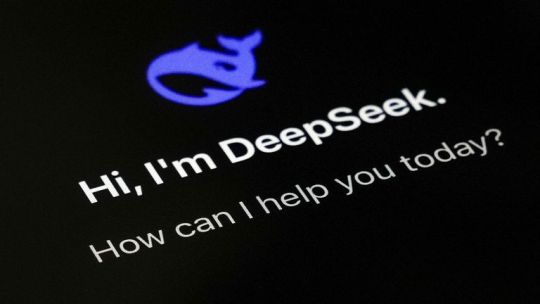
The DeepSeek panic reveals an AI world ready to blow❗💥
The R1 chatbot has sent the tech world spinning – but this tells us less about China than it does about western neuroses
The arrival of DeepSeek R1, an AI language model built by the Chinese AI lab DeepSeek, has been nothing less than seismic. The system only launched last week, but already the app has shot to the top of download charts, sparked a $1tn (£800bn) sell-off of tech stocks, and elicited apocalyptic commentary in Silicon Valley. The simplest take on R1 is correct: it’s an AI system equal in capability to state-of-the-art US models that was built on a shoestring budget, thus demonstrating Chinese technological prowess. But the big lesson is perhaps not what DeepSeek R1 reveals about China, but about western neuroses surrounding AI.
For AI obsessives, the arrival of R1 was not a total shock. DeepSeek was founded in 2023 as a subsidiary of the Chinese hedge fund High-Flyer, which focuses on data-heavy financial analysis – a field that demands similar skills to top-end AI research. Its subsidiary lab quickly started producing innovative papers, and CEO Liang Wenfeng told interviewers last November that the work was motivated not by profit but “passion and curiosity”.
This approach has paid off, and last December the company launched DeepSeek-V3, a predecessor of R1 with the same appealing qualities of high performance and low cost. Like ChatGPT, V3 and R1 are large language models (LLMs): chatbots that can be put to a huge variety of uses, from copywriting to coding. Leading AI researcher Andrej Karpathy spotted the company’s potential last year, commenting on the launch of V3: “DeepSeek (Chinese AI co) making it look easy today with an open weights release of a frontier-grade LLM trained on a joke of a budget.” (That quoted budget was $6m – hardly pocket change, but orders of magnitude less than the $100m-plus needed to train OpenAI’s GPT-4 in 2023.)
R1’s impact has been far greater for a few different reasons.
First, it’s what’s known as a “chain of thought” model, which means that when you give it a query, it talks itself through the answer: a simple trick that hugely improves response quality. This has not only made R1 directly comparable to OpenAI’s o1 model (another chain of thought system whose performance R1 rivals) but boosted its ability to answer maths and coding queries – problems that AI experts value highly. Also, R1 is much more accessible. Not only is it free to use via the app (as opposed to the $20 a month you have to pay OpenAI to talk to o1) but it’s totally free for developers to download and implement into their businesses. All of this has meant that R1’s performance has been easier to appreciate, just as ChatGPT’s chat interface made existing AI smarts accessible for the first time in 2022.
Second, the method of R1’s creation undermines Silicon Valley’s current approach to AI. The dominant paradigm in the US is to scale up existing models by simply adding more data and more computing power to achieve greater performance. It’s this approach that has led to huge increases in energy demands for the sector and tied tech companies to politicians. The bill for developing AI is so huge that techies now want to leverage state financing and infrastructure, while politicians want to buy their loyalty and be seen supporting growing companies. (See, for example, Trump’s $500bn “Stargate” announcement earlier this month.) R1 overturns the accepted wisdom that scaling is the way forward. The system is thought to be 95% cheaper than OpenAI’s o1 and uses one tenth of the computing power of another comparable LLM, Meta’s Llama 3.1 model. To achieve equivalent performance at a fraction of the budget is what’s truly shocking about R1, and it’s this that has made its launch so impactful. It suggests that US companies are throwing money away and can be beaten by more nimble competitors.
But after these baseline observations, it gets tricky to say exactly what R1 “means” for AI. Some are arguing that R1’s launch shows we’re overvaluing companies like Nvidia, which makes the chips integral to the scaling paradigm. But it’s also possible the opposite is true: that R1 shows AI services will fall in price and demand will, therefore, increase (an economic effect known as Jevons paradox, which Microsoft CEO Satya Nadella helpfully shared a link to on Monday). Similarly, you might argue that R1’s launch shows the failure of US policy to limit Chinese tech development via export controls on chips. But, as AI policy researcher Lennart Heim has argued, export controls take time to work and affect not just AI training but deployment across the economy. So, even if export controls don’t stop the launches of flagships systems like R1, they might still help the US retain its technological lead (if that’s the outcome you want).
All of this is to say that the exact effects of R1’s launch are impossible to predict. There are too many complicating factors and too many unknowns to say what the future holds. However, that hasn’t stopped the tech world and markets reacting in a frenzy, with CEOs panicking, stock prices cratering, and analysts scrambling to revise predictions for the sector. And what this really shows is that the world of AI is febrile, unpredictable and overly reactive. This a dangerous combination, and if R1 doesn’t cause a destructive meltdown of this system, it’s likely that some future launch will.
Daily inspiration. Discover more photos at Just for Books…?
#just for books#DeepSeek#Opinion#Artificial intelligence (AI)#Computing#China#Asia Pacific#message from the editor
27 notes
·
View notes
Text
Theres something a bit despairing watching the AI generated starter pack trend while I'm out there cutting and pasting pictures in photo editing apps and finger painting the gaps and colour corrections pixel by pixel. Or watching your classmate chat gpt their essays and works while I ressearch and take pleasure in writing it and developping my reasoning. Or watching yet another shitty AI drawing while I pull out my pencils and markers and pens and Create!
Where is the passion, where is the soul, where is the joy?
11 notes
·
View notes
Note
Ai generated Rp has actually been around for a while (I remember such a project existing since about 2015-2018), but they trained it using people who consented to their inputs being used to train said ai by going to a website or downloading an app. I believe that's the kind of Ai they are using, not stuff like Chat GPT. (I know this because I used it for about a week.) I trust that the cast and developers of Misadventures SMP are using one of those models, as they might be using the same model as was used in Pirates SMP. I also trust that they've done their due diligence to make sure that the model they are using isn't extremely energy intensive.
Again
I'm not accusing them of being evil monsters, I'm sure even in the worst case scenario they aren't being malicious.
We don't know enough though, that's the problem
Its a bit of a hope for the best prepare yourself for the worst situation.
16 notes
·
View notes
Text

How can chatgpt can replace programmers A Complete Guide
Introduction
The creation of AI-driven coding helpers such as chatgpt can replace programmers is one of the most significant advances in a variety of fields brought forth by the advent of artificial intelligence. OpenAI’s potent tool has prompted discussions about whether AI can take the place of human programmers. We will look at how to use ChatGPT in app development, how it can eventually replace programmers, and what the future holds for AI in the software sector in this extensive guide.
Understanding ChatGPT and Its Capabilities
ChatGPT as an App Developer
OpenAI’s ChatGPT language model aims to comprehend and produce text that is similar to that of a person. It can help with many different things, like creating content and responding to inquiries. The development of apps is among its most exciting uses. Developers can benefit from ChatGPT’s ability to generate code snippets, debug, and even build whole programs from scratch. ChatGPT’s capacity to comprehend complex programming languages and frameworks might greatly speed the development process.
How ChatGPT Can Replace Programmers
The idea of chatgpt can replace programmers, stems from its ability to handle various coding tasks autonomously. Here are some ways in which ChatGPT can potentially replace human programmers:
Automated Code Generation: Based on the user’s specific needs, openai replace programmers can produce code. This removes the need for human coding and covers anything from basic routines to complex formulas.
Debugging and Troubleshooting:For programmers, finding and fixing issues takes a lot of time. ChatGPT simplifies the procedure for debugging by analyzing code, locating mistakes, and making repair suggestions .
Learning and Adapting: chatgpt can replace programmers, is able to stay up to date with the newest programming trends and best practices because it is constantly learning from massive volumes of data. Its flexibility guarantees that the code it produces is current and effective.
Documentation and Comments: Maintaining code requires writing comments and documentation. It is possible for chatgpt can replace programmers to automatically provide comprehensive comments and documentation, which facilitates understanding and code editing for other developers.
Real-World Applications of ChatGPT in Development
Developers of ChatGPT
The creators of chat gpt app developer have incorporated cutting-edge natural language processing methods to produce a program that can comprehend and produce code. This has created new opportunities for software development tasks that are routine and repetitive to be automated. Here are a few examples of practical uses:
Creating Prototypes: developers of chatgpt can quickly generate prototypes based on user requirements, allowing developers to test and refine ideas faster.
Refactoring Code: Maintaining and improving existing code is essential for long-term projects. ChatGPT can assist in refactoring code to improve readability, performance, and maintainability.
Generating Test Cases: Writing test cases is crucial for ensuring code quality. ChatGPT can generate comprehensive test cases, helping developers catch potential issues early in the development cycle.
Cross-Platform Development: chat gpt app developer can assist in developing applications that work seamlessly across different platforms, such as web, mobile, and desktop, by generating platform-specific code and ensuring compatibility.
The Future of AI in Programming
OpenAI Replacing Programmers: Myth or Reality?
Even though chatgpt can replace programmers and related AI tools have many benefits, it is still realistic to think that openai replace programmers entirely. Here are some explanations for why human programmers are still required :
Creativity and Innovation: Human programmers bring creativity and innovation to the table, which is crucial for developing unique and groundbreaking applications. AI, while powerful, lacks the ability to think outside the box and come up with novel solutions.
Complex Problem-Solving: Some programming challenges require deep understanding and nuanced problem-solving skills that AI cannot replicate. Human intuition and experience play a vital role in tackling such issues.
Ethical Considerations: chatgpt can replace programmers, involves making ethical decisions, especially in areas like data privacy and security. Human programmers are better equipped to navigate these ethical dilemmas.
Collaboration and Communication: Software development is a collaborative process that involves working with teams, stakeholders, and end-users. Human programmers excel in communication and teamwork, ensuring that projects meet the needs and expectations of all parties involved.
For any Digital Marketing services in India click here
Conclusion
Even though chatgpt can replace programmers is an effective technology that may automate a lot of the process of developing apps, it is unlikely to completely replace human programmers. Rather, it functions as a useful aide, enhancing the skills of developers and optimizing the development procedure. Programming appears to have a bright future thanks to the fusion of human creativity with artificial intelligence, which will allow for the development of increasingly creative and effective solutions.
#chat gpt app developer#openai replace programmers#chatgpt can replace programmers#developers of chatgpt
0 notes
Text
🚀 BREAKING: Get FREE Access to the Most Powerful AI Tools! 🔥
AI is revolutionizing the way we work, create, and innovate. What if I told you that you could access some of the best AI tools for FREE? Yes, you heard that right! Whether you're a content creator, developer, entrepreneur, or just AI-curious, these tools will supercharge your productivity and creativity—without spending a dime! 💰✨
🔥 Here’s what you get for FREE:
✅ DeepSeek Chat – A powerful AI model that provides intelligent and natural conversations. ✅ ChatGPT Plus (Free Access) – Enjoy GPT-4 level responses without paying for a Plus subscription! ✅ Claude AI – A next-gen AI assistant that’s great for writing, coding, and brainstorming. ✅ GEMINI PRO (Google's AI) – Get access to Google’s advanced AI model for FREE. ✅ No-Code AI App Builder – Build your own AI-powered apps without coding!
These tools are usually locked behind paywalls, but I’ve found a way for you to use them without any cost! 💡
🎥 Want to see how? Watch this video:
👉 https://youtu.be/fEijFPmK4l4?si=o4UMM3Ym9xa_dpRM
In this video, I break down exactly how you can access and use these AI tools for free! Don’t miss out—this could change the way you work forever! 🚀
💬 Drop a "🔥" in the comments if you’re excited to try these tools! Let’s embrace the AI revolution together! 🤖✨
#AIForEveryone #FreeAI #ChatGPT #Claude #GeminiPro #NoCode #AIBuilder #ArtificialIntelligence
6 notes
·
View notes
Text
A Review on Merlin Lifetime deals.
It’s hard to believe AI tools help you work smarter when you’re still stuck switching between tabs to get things done. (“Just call me an AI assistant juggler.”)
With so many AI models and features on the market, you’re using way too much tech to research and generate different types of content.
What if there was a Chrome extension packed with all the AI models you need to speed up your research and content creation process?
Overview:
Merlin is a Chrome browser extension and web app that gives you access to popular AI models to research, summarize, and write content.
Best for:
Alternatives to:Integrations:Main Features:
Educators
Marketers
Small businesses
Copy.ai
Grammarly
Jasper
Facebook
Gmail
LinkedIn
Outlook
Twitter
GDPR-compliant
AI
Pros and cons:
Chat with leading AI models, from one browser
With Merlin, you’ll receive access to prominent AI models, like GPT-4, Claude-3, Gemini 1.5, Leonardo, and others—all from your Chrome web browser.
No more moving between browser tabs! Use Merlin’s AI Chatbot on every websites you visit.
Use complex image-generation models to develop captivating brand storylines.
Plans & features
Deal terms & conditions
Lifetime access to Merlin
All future Pro Plan updates
If Plan name changes, deal will be mapped to the new Plan name with all accompanying updates
No codes, no stacking—just choose the plan that’s right for you
You must activate your license within 60 days of purchase
Ability to upgrade between 3 license tiers while the deal is available
Ability to downgrade between 3 license tiers within 60 days of purchase
GDPR compliant
Available for new Merlin users and returning AppSumo purchasers
Previous AppSumo customers who purchased Merlin can upgrade their license to increase their feature limits
1 Merlin query = 1 Chat GPT 3.5 query
Find all other AI model Query Standards here
All purchasers subject to Merlin’s Terms & Conditions
60 day money-back guarantee. Try it out for 2 months to make sure it’s right for you!
Features included in all plans
Chat with documents
Image generation
Chatbots
Chat with web pages
YouTube summarization
Blog summarization
Twitter, Gmail, Outlook, and LinkedIn FAB bars
LinkedIn Pro connect
Create from YouTube
Post in YouTube comments
AI personas
2 notes
·
View notes
Text
Deadline: January 21st, 2024 Payment: $100 per story Theme: 500-1000 word speculative fiction stories Hello fellow writers and readers, this is Rebecca Halsey, the new publisher for Flash Fiction Online. We are coming into 2024 with a decently sized queue of literary stories and reprints. Therefore, for our January 2024 reading period, we will only be accepting original speculative fiction. We will consider fantasy, science fiction, horror, and all the fabulous cross-sub-genre goodness within that lot. As is our custom, we will be open until the 21st of the month unless the 425 submissions cap is reached. We look forward to reading your stories! SUBMISSION GUIDELINES We are looking for complete 500- to 1000-word stories with crisp prose, well-developed characters, compelling plots, and satisfying resolutions. We want stories that engage our minds and emotions. We publish across many genres, including speculative (science fiction, fantasy, slipstream, and horror) and literary fiction. For more information on the type of stories we enjoy, please read a few issues and check out our "What We're Looking For" page. Please note, that for January 2024, we will be accepting speculative fiction stories only. SUBMISSION WINDOW: We will be open to submissions on January 1st, and until January 21st, or until our 425 submission cap is reached, whichever comes first. FORMATTING: Please format your submission in a double-spaced, 12pt Times New Roman or other serif-type font (NO Courier), with standard 1" margins and black font on an unadorned, white background. No PDF submissions. No Images and no graphics. ANONYMOUS SUBMISSIONS: Do not include your name, address, email, or other identifying information on your manuscript (header, byline, file name, etc). SIMULTANEOUS SUBMISSIONS: For the January 2024 reading period, we will accept simultaneous submissions. MULTIPLE SUBMISSIONS: You may submit only one original story to the January 2024 reading period. AI-GENERATED SUBMISSIONS: We are committed to publishing stories written and edited by humans. We reserve the right to reject any submission that we suspect to be primarily generated or created by language modeling software, Chat GPT, chat bots, or any other AI apps, bots, or software. We reserve the right to ban submissions from accounts, emails, or users who we believe or suspect have submitted AI-generated content. QUERIES: You can check on the status of your submission at any time via your Submittable account. If, after 8 weeks, your submission is still marked as "in-progress," you may email [email protected] with QUERY in the subject line for an update on its status. (Submissions sent to this address will be deleted unread.) COMPENSATION: Our 2024 rate is $100 for each original story. We are unable to provide personal feedback or critiques. We do NOT accept resubmissions of stories previously rejected by Flash Fiction Online, unless requested by the Editor. We will NOT consider stories that promote or affirm hatred, prejudice, or violence toward any group of people based on age, race, nationality, religion, sex, gender, political affiliation, disability, neurodiversity, or other social identity. Love what we publish? Flash Fiction Online is funded entirely through the generosity and support of our readers! Check out our Patreon here. Via: Flash Fiction ONline.
4 notes
·
View notes
Text
A shorter sum-up that may correct some of the inevitable misunderstandings from the rather loose use of the term "scrape."
A guy making low-rent audiobooks downloaded a huge chunk of AO3 content for his robots to read, in the precise same way creepypasta youtubers have been operating for years.
That's it, that's the whole deal.
Generally in AI conversations it means to harvest and process training data. Whereas here it's being used in the older, pre-AI term, of grabbing a bunch of data from an un-or-under-protected website via bot.
Which yeah, it's scummy, but it's analogue scummy, and well in keeping with a number of common copyright misconceptions. I can't tell you how many idiots I've met that thought fanworks had no IP protections because they were violations of the corporate owners' IP.
But this?
**A note about the AI that Weitzman used to steal our work: it’s even greasier than it looks at first glance. It’s not just the method he used to lift works off AO3 and then regurgitate onto his own website and app. Looking beyond the untold horrors of his AI-generated cover ‘art’, in many cases these covers attempt to depict something from the fics in question that can’t be gleaned from their summaries alone. In addition, my fics (and I assume the others, as well) were listed with generated genres; tags that did not appear anywhere in or on my fic on AO3 and were sometimes scarily accurate and sometimes way off the mark. I remember You & Me & Holiday Wine had ‘found family’ (100% correct, but not tagged by me as such) and I believe The Shape of Soup was listed as, among others, ‘enemies to friends to lovers’ and ‘love triangle’ (both wildly inaccurate). Even worse, not all the fic listed (as authors on Reddit pointed out) came with their original summaries at all. Often the entire summary was AI-generated. All of these things make it very clear that it was an all-encompassing scrape—not only were our fics stolen, they were also fed word-for-word into the AI Weitzman used and then analyzed to suit Weitzman’s needs. This means our work was literally fed to this AI to basically do with whatever its other users want, including (one assumes) text generation.
That's not how any of this works.

The OP is acting as though this is all being done through a single, automated system, and it isn't. Even the idea that this is Weitzman's AI is silly, as he's likely using off the shelf services. This scam is too petty to justify the cost of anything custom in either time or cash.
Here's what's actually going down, in all likelihood, on the pirate's side of things:
He figured out the most popular works via simple metrics and got a bog-standard website downloader go to work on it or he spent a night right-clicking.
The resulting files for the fics were loaded into word or some similar program and a macro was used to automatically fix formatting for the autoreader.
He ran each fic through an autoreader, and posted those like any other .mp3 file.
Meanwhile, he gave Chat GPT the story link and said "Summarize this and give me a cover prompt"
He takes the cover prompts and runs them in Midjourney with some standard formatting cues.
Now, what isn't happening at any stage in this process is processing the work into a dataset.
Generative AI systems do not continually harvest and incorporation information given to them by end users.
This is outside of their capabilities with a few specific exceptions ( Some AI services log user interaction for later processing into a training dataset, but that is a separate process, and Chat-GPT has features to webcrawl specific sources of "Trustworthy information" but in those cases its functioning as a search engine.) But incorporating data into the training dataset requires crunching the whole set of weights.
Even if one developed a generative AI system that could actively harvest and learn information, you wouldn't want to let it. Unfiltered junk data degrades dataset quality very quickly and is an open invitation to disruptive overfitting through users being generally repetitive. It's okay for more than half your users to generate pictures of dogs or cats playing in the clouds, but you don't want that to be half your dataset.
The situation being, the disagreeable aspects of this scenario are all forms of analogue jackassery, people have been swiping fiction off the net and turning it into shitty autoreader autobooks for long before generative AI came around.
The only difference here is the quality of the robot voice and the thumbnail art.
And as to worries about AO3's stories being scraped for AI training, well, AO3 is part of the generally indexed internet-

-the chicken is already in the nugget. ChatGPT gobbled it up ages ago, and Google and Bing had done so before that as part of their search indexing.
Now, every AO3 author who is upset is well within their rights to be so. Their work was pirated in a non-transformative way, and this guy's mistake was setting up with completed ebooks rather than hawking a "I will autoread any webpage" app.
But there is a certain irony to the real panic being that the work might have been turned into a dataset for the creation of new works when that panic comes from fanwork creators. If dataset training is theft then so are fanworks.

SO HERE IS THE WHOLE STORY (SO FAR).
I am on my knees begging you to reblog this post and to stop reblogging the original ones I sent out yesterday. This is the complete account with all the most recent info; the other one is just sending people down senselessly panicked avenues that no longer lead anywhere.
IN SHORT
Cliff Weitzman, CEO of Speechify and (aspiring?) voice actor, used AI to scrape thousands of popular, finished works off AO3 to list them on his own for-profit website and in his attached app. He did this without getting any kind of permission from the authors of said work or informing AO3. Obviously.
When fandom at large was made aware of his theft and started pushing back, Weitzman issued a non-apology on the original social media posts—using
his dyslexia;
his intent to implement a tip-system for the plagiarized authors; and
a sudden willingness to take down the work of every author who saw my original social media posts and emailed him individually with a ‘valid’ claim,
as reasons we should allow him to continue monetizing fanwork for his own financial gain.
When we less-than-kindly refused, he took down his ‘apologies’ as well as his website (allegedly—it’s possible that our complaints to his web host, the deluge of emails he received or the unanticipated traffic brought it down, since there wasn’t any sort of official statement made about it), and when it came back up several hours later, all of the work formerly listed in the fan fiction category was no longer there.
THE TAKEAWAYS
1. Cliff Weitzman (aka Ofek Weitzman) is a scumbag with no qualms about taking fanwork without permission, feeding it to AI and monetizing it for his own financial gain;
2. Fandom can really get things done when it wants to, and
3. Our fanworks appear to be hidden, but they’re NOT DELETED from Weitzman’s servers, and independently published, original works are still listed without the authors' permission. We need to hold this man responsible for his theft, keep an eye on both his current and future endeavors, and take action immediately when he crosses the line again.
THE TIMELINE, THE DETAILS, THE SCREENSHOTS (behind the cut)
Sunday night, December 22nd 2024, I noticed an influx in visitors to my fic You & Me & Holiday Wine. When I searched the title online, hoping to find out where they came from, a new listing popped up (third one down, no less):

This listing is still up today, by the way, though now when you follow the link to word-stream, it just brings you to the main site. (Also, to be clear, this was not the cause for the influx of traffic to my fic; word-stream did not link back to the original work anywhere.)
I followed the link to word-stream, where to my horror Y&M&HW was listed in its entirety—though, beyond the first half of the first chapter, behind a paywall—along with a link promising to take me—through an app downloadable on the Apple Store—to an AI-narrated audiobook version. When I searched word-stream itself for my ao3 handle I found both of my multi-chapter fics were listed this way:
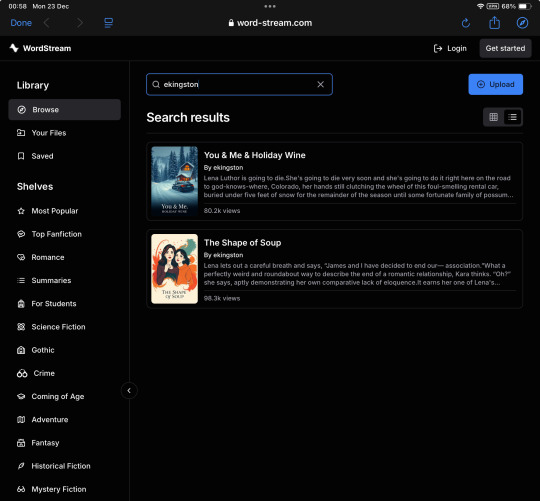
Because the tags on my fics (which included genres* and characters, but never the original IPs**) weren’t working, I put ‘Kara Danvers’ into the search bar and discovered that many more supercorp fics (Supergirl TV fandom, Kara Danvers/Lena Luthor pairing) were listed.
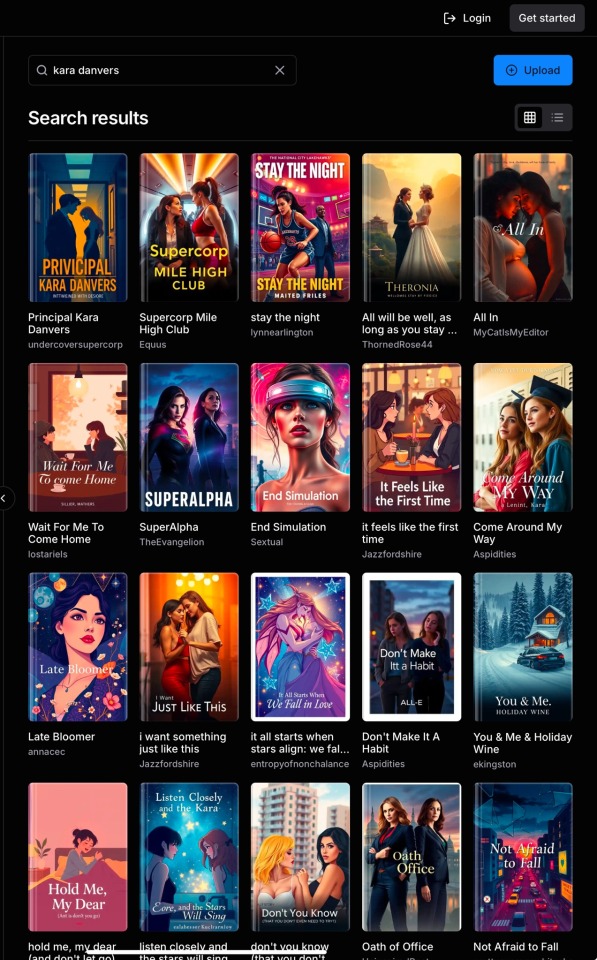
I went looking online for any mention of word-stream and AI plagiarism (the covers—as well as the ridiculously inflated number of reviews and ratings—made it immediately obvious that AI fuckery was involved), but found almost nothing: only one single Reddit post had been made, and it received (at that time) only a handful of upvotes and no advice.
I decided to make a tumblr post to bring the supercorp fandom up to speed about the theft. I draw as well as write for fandom and I’ve only ever had to deal with art theft—which has a clear set of steps to take depending on where said art was reposted—and I was at a loss regarding where to start in this situation.
After my post went up I remembered Project Copy Knight, which is worth commending for the work they’ve done to get fic stolen from AO3 taken down from monetized AI 'audiobook’ YouTube accounts. I reached out to @echoekhi, asking if they’d heard of this site and whether they could advise me on how to get our works taken down.

While waiting for a reply I looked into Copy Knight’s methods and decided to contact OTW’s legal department:
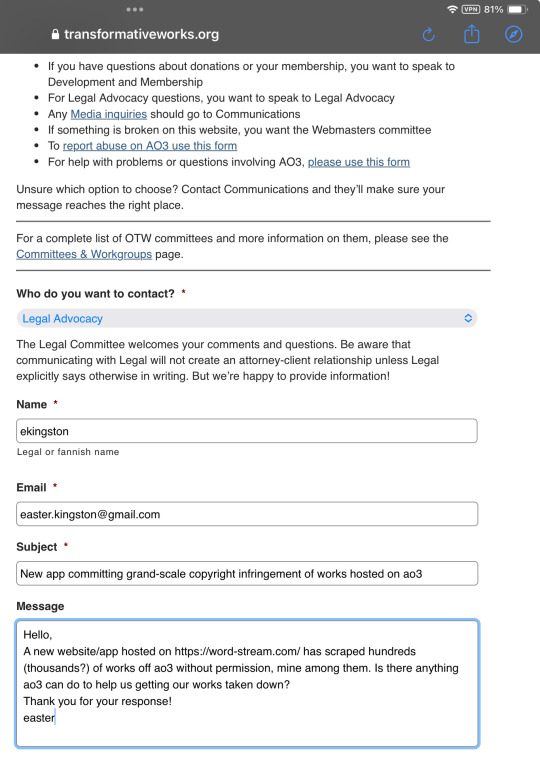
And then I went to bed.
By morning, tumblr friends @makicarn and @fazedlight as well as a very helpful tumblr anon had seen my post and done some very productive sleuthing:
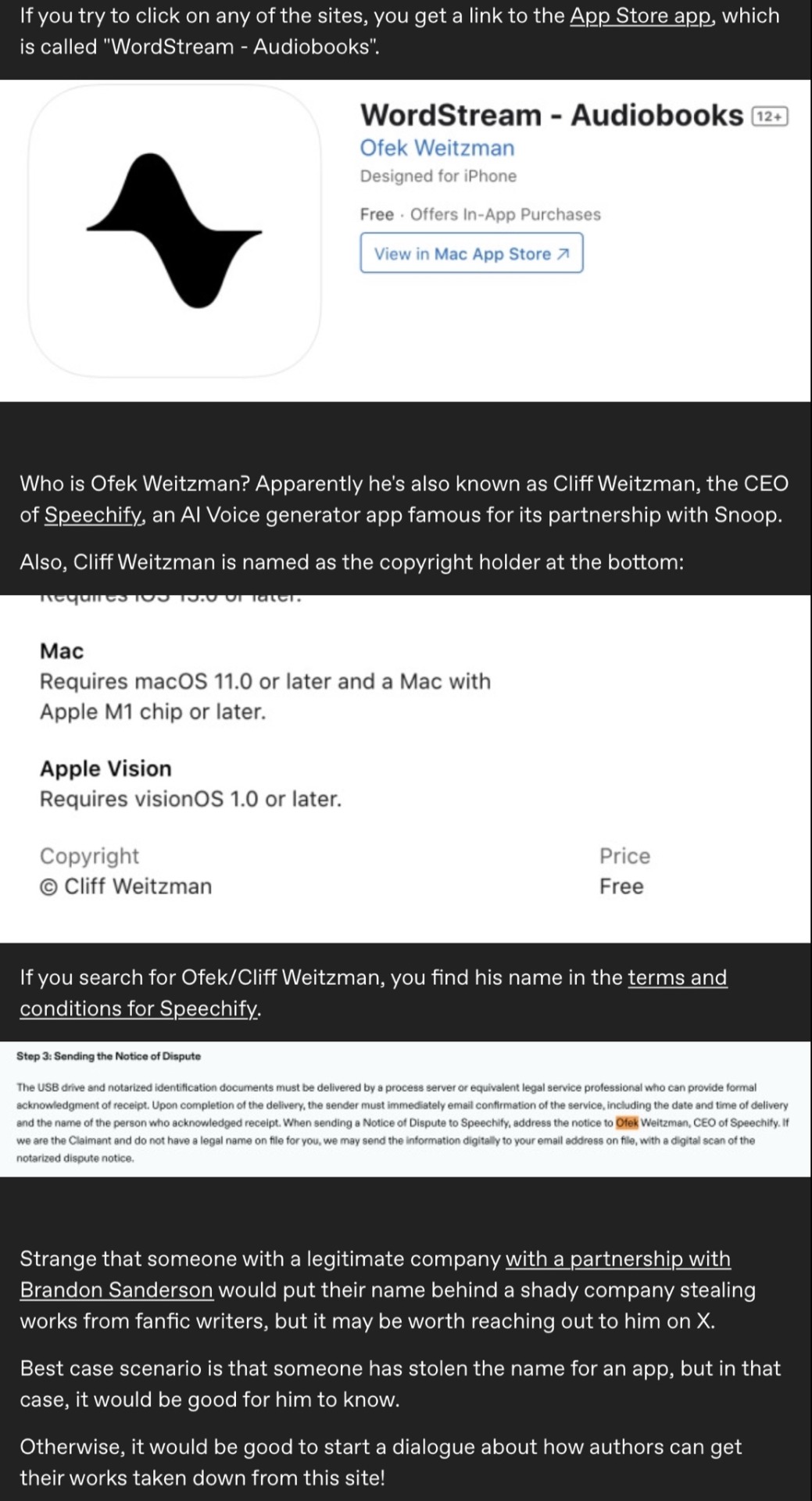
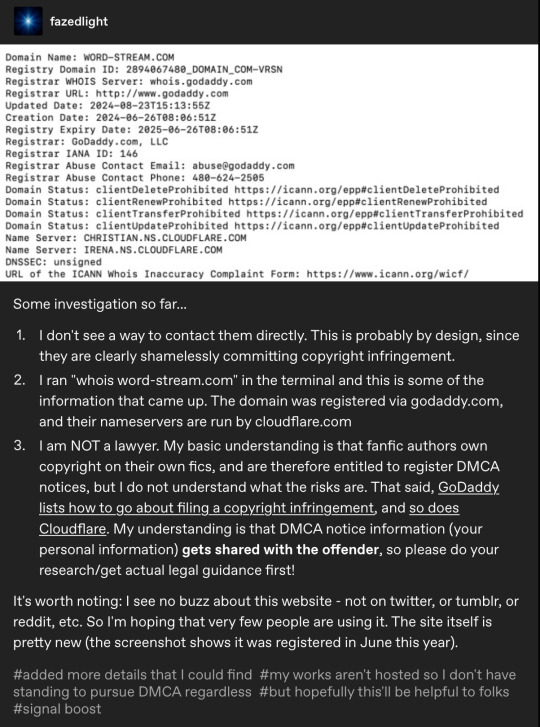
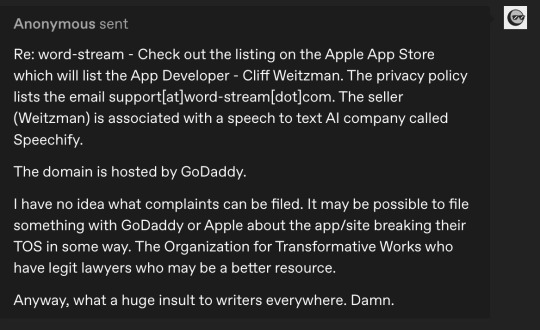
@echoekhi had also gotten back to me, advising me, as expected, to contact the OTW. So I decided to sit tight until I got a response from them.
That response came only an hour or so later:
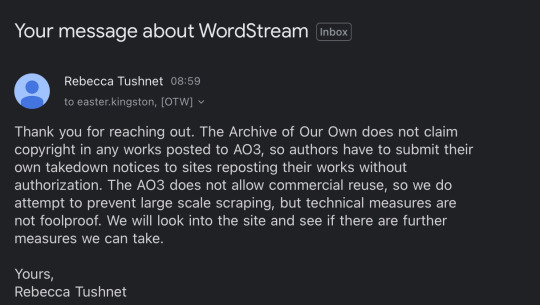
Which was 100% understandable, but still disappointing—I doubted a handful of individual takedown requests would accomplish much, and I wasn’t eager to share my given name and personal information with Cliff Weitzman himself, which is unavoidable if you want to file a DMCA.
I decided to take it to Reddit, hoping it would gain traction in the wider fanfic community, considering so many fandoms were affected. My Reddit posts (with the updates at the bottom as they were emerging) can be found here and here.
A helpful Reddit user posted a guide on how users could go about filing a DMCA against word-stream here (to wobbly-at-best results)
A different helpful Reddit user signed up to access insight into word-streams pricing. Comment is here.
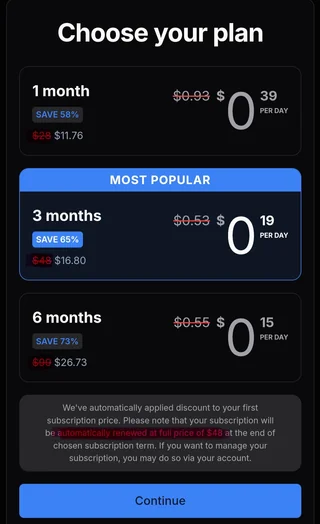
Smells unbelievably scammy, right? In addition to those audacious prices—though in all fairness any amount of money would be audacious considering every work listed is accessible elsewhere for free—my dyscalculia is screaming silently at the sight of that completely unnecessary amount of intentionally obscured numbers.
Speaking of which! As soon as the post on r/AO3—and, as a result, my original tumblr post—began taking off properly, sometime around 1 pm, jumpscare! A notification that a tumblr account named @cliffweitzman had commented on my post, and I got a bit mad about the gist of his message :
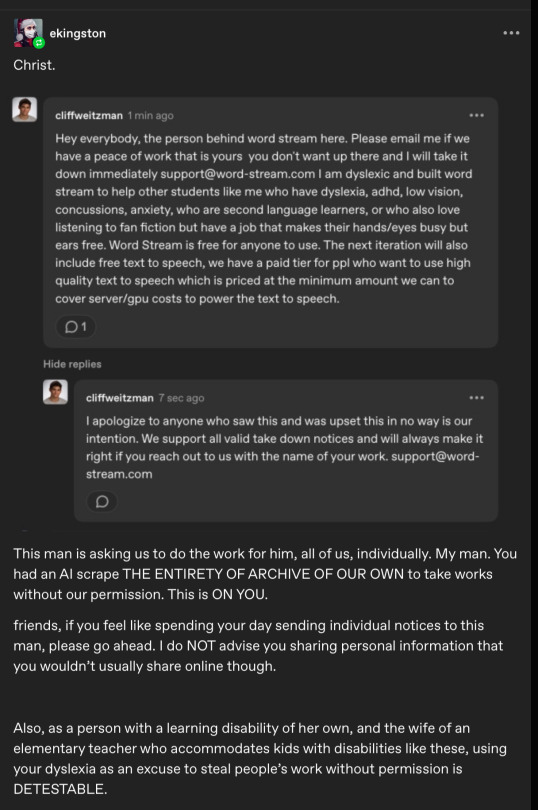
Fortunately he caught plenty of flack in the comments from other users (truly you should check out the comment section, it is extremely gratifying and people are making tremendously good points), in response to which, of course, he first tried to both reiterate and renegotiate his point in a second, longer comment (which I didn’t screenshot in time so I’m sorry for the crappy notification email formatting):
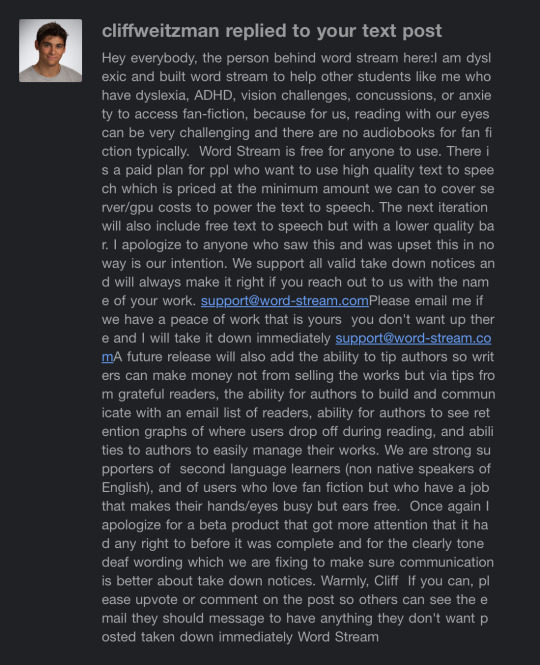
which he then proceeded to also post to Reddit (this is another Reddit user’s screenshot, I didn’t see it at all, the notifications were moving too fast for me to follow by then)
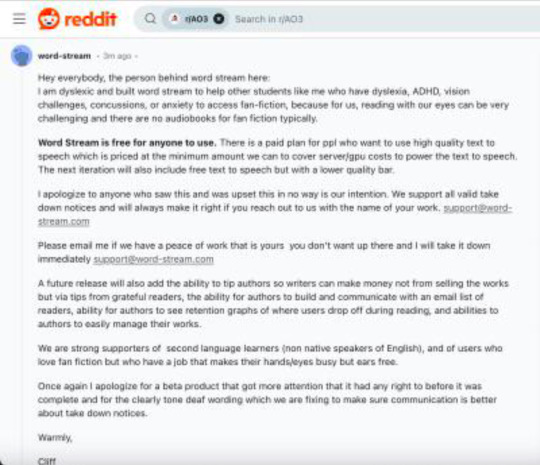
... where he got a roughly equal amount of righteously furious replies. (Check downthread, they're still there, all the way at the bottom.)
After which Cliff went ahead & deleted his messages altogether.
It’s not entirely clear whether his account was suspended by Reddit soon after or whether he deleted it himself, but considering his tumblr account is still intact, I assume it’s the former. He made a handful of sock puppet accounts to play around with for a while, both on Reddit and Tumblr, only one of which I have a screenshot of, but since they all say roughly the same thing, you’re not missing much:
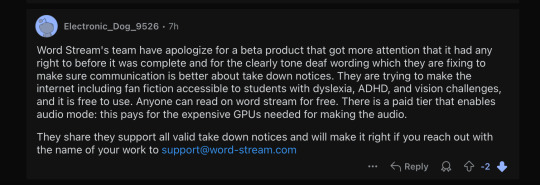
And then word-stream started throwing a DNS error.
That lasted for a good number of hours, which was unfortunately right around the time that a lot of authors first heard about the situation and started asking me individually how to find out whether their work was stolen too. I do not have that information and I am unclear on the perimeters Weitzman set for his AI scraper, so this is all conjecture: it LOOKS like the fics that were lifted had three things in common:
They were completed works;
They had over several thousand kudos on AO3; and
They were written by authors who had actively posted or updated work over the past year.
If anyone knows more about these perimeters or has info that counters my observation, please let me know!
I finally thought to check/alert evil Twitter during this time, and found out that the news was doing the rounds there already. I made a quick thread summarizing everything that had happened just in case. You can find it here.
I went to Bluesky too, where fandom was doing all the heavy lifting for me already, so I just reskeeted, as you do, and carried on.
Sometime in the very early evening, word-stream went back up—but the fan fiction category was nowhere to be seen. Tentative joy and celebration!***
That’s when several users—the ones who had signed up for accounts to gain intel and had accessed their own fics that way—reported that their work could still be accessed through their history. Relevant Reddit post here.
Sooo—
We’re obviously not done. The fanwork that was stolen by Weitzman may be inaccessible through his website right now, but they aren’t actually gone. And the fact that Weitzman wasn’t willing to get rid of them altogether means he still has plans for them.
This was my final edit on my Reddit post before turning off notifications, and it's pretty much where my head will be at for at least the foreseeable future:
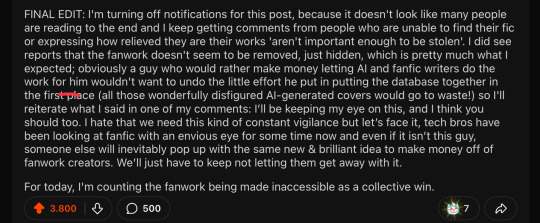
Please feel free to add info in the comments, make your own posts, take whatever action you want to take to protect your work. I only beg you—seriously, I’m on my knees here—to not give up like I saw a handful of people express the urge to do. Keep sharing your creative work and remain vigilant and stay active to make sure we can continue to do so freely. Visit your favorite fics, and the ones you’ve kept in your ‘marked for later’ lists but never made time to read, and leave kudos, leave comments, support your fandom creatives, celebrate podficcers and support AO3. We created this place and it’s our responsibility to keep it alive and thriving for as long as we possibly can.
Also FUCK generative AI. It has NO place in fandom spaces.
THE 'SMALL' PRINT (some of it in all caps):
*Weitzman knew what he was doing and can NOT claim ignorance. One, it’s pretty basic kindergarten stuff that you don’t steal some other kid’s art project and present it as your own only to act surprised when they protest and then tell the victim that they should have told you sooner that they didn’t want their project stolen. And two, he was very careful never to list the IPs these fanworks were based on, so it’s clear he was at least familiar enough with the legalities to not get himself in hot water with corporate lawyers. Fucking over fans, though, he figured he could get away with that.
**A note about the AI that Weitzman used to steal our work: it’s even greasier than it looks at first glance. It’s not just the method he used to lift works off AO3 and then regurgitate onto his own website and app. Looking beyond the untold horrors of his AI-generated cover ‘art’, in many cases these covers attempt to depict something from the fics in question that can’t be gleaned from their summaries alone. In addition, my fics (and I assume the others, as well) were listed with generated genres; tags that did not appear anywhere in or on my fic on AO3 and were sometimes scarily accurate and sometimes way off the mark. I remember You & Me & Holiday Wine had ‘found family’ (100% correct, but not tagged by me as such) and I believe The Shape of Soup was listed as, among others, ‘enemies to friends to lovers’ and ‘love triangle’ (both wildly inaccurate). Even worse, not all the fic listed (as authors on Reddit pointed out) came with their original summaries at all. Often the entire summary was AI-generated. All of these things make it very clear that it was an all-encompassing scrape—not only were our fics stolen, they were also fed word-for-word into the AI Weitzman used and then analyzed to suit Weitzman’s needs. This means our work was literally fed to this AI to basically do with whatever its other users want, including (one assumes) text generation.
***Fan fiction appears to have been made (largely) inaccessible on word-stream at this time, but I’m hearing from several authors that their original, independently published work, which is listed at places like Kindle Unlimited, DOES still appear in word-stream’s search engine. This obviously hurts writers, especially independent ones, who depend on these works for income and, as a rule, don’t have a huge budget or a legal team with oceans of time to fight these battles for them. If you consider yourself an author in the broader sense, beyond merely existing online as a fandom author, beyond concerns that your own work is immediately at risk, DO NOT STOP MAKING NOISE ABOUT THIS.
Again, please, please PLEASE reblog this post instead of the one I sent originally. All the information is here, and it's driving me nuts to see the old ones are still passed around, sending people on wild goose chases.
Thank you all so much.
48K notes
·
View notes
Text
WHAT IS CHAT GPT ? EVERYTHING YOU NEED TO KNOW ABOUT AI REVOLUTION

Introduction
In the age of rapid technological advancement, AI has emerged as a game-changer. One of the most talked-about innovations in this space is ChatGPT, a language model developed by OpenAI. Whether you are a content creator, developer, entrepreneur, or simply an enthusiast, understanding ChatGPT is crucial in 2025.
In this blog, we’ll explore what ChatGPT is, how it works, its real-world applications, pros and cons, and future trends—all written with proper SEO best practices to help you find and understand everything about this AI marvel.
What is ChatGPT?
ChatGPT is an advanced language model created by OpenAI. It’s based on the GPT (Generative Pre-trained Transformer) architecture, which allows it to understand and generate human-like text. The current version, known as GPT-4, has evolved significantly from earlier models, providing more accurate, context-aware, and creative responses.
Core Features of ChatGPT:
Natural language processing (NLP)
Contextual understanding
Multilingual support
Code generation and debugging
Creative writing, blogging, and storytelling
Real-time conversation simulations
Keyword Tip: Focus keywords here include: ChatGPT, AI chatbot, OpenAI, language model, GPT-4.
How Does ChatGPT Work?
ChatGPT uses a deep learning technique called the Transformer architecture. This allows it to analyze large datasets and predict the next word in a sentence based on the context of previous words. It's been trained on a massive dataset including books, websites, and online conversations.
When you type a question or prompt, ChatGPT processes your input, analyzes the context, and generates a coherent response. This process happens in milliseconds, providing almost real-time interaction.
Training and Fine-Tuning
OpenAI fine-tunes ChatGPT using Reinforcement Learning from Human Feedback (RLHF), ensuring safer and more aligned responses with user expectations.
Why is ChatGPT So Popular?
There are several reasons why ChatGPT has taken the digital world by storm:
1. Versatility
ChatGPT can be used for a wide range of tasks: customer support, content creation, coding, tutoring, and even mental health conversations.
2. Accessibility
Available through web apps, APIs, and integrations like Microsoft Copilot and Discord, ChatGPT is easily accessible to individuals and businesses alike.
3. Constant Improvement
OpenAI continuously updates ChatGPT, improving its accuracy, reasoning ability, and memory (for users with memory-enabled accounts).
4. Personal and Business Applications
From helping students write essays to assisting developers with coding tasks, ChatGPT bridges gaps across industries.
Keyword Focus: AI content creation, AI chatbot use cases, benefits of ChatGPT
Top Real-World Applications of ChatGPT
1. Content Creation
Blogging
Copywriting
SEO optimization
Social media content
2. Customer Support
Businesses integrate ChatGPT into chatbots to offer 24/7 customer service, reducing response time and support costs.
3. Education and Learning
Students use ChatGPT to get tutoring help, summarize topics, or improve their writing. It acts like an always-available study partner.
4. Programming Assistance
Developers use ChatGPT for:
Writing code snippets
Explaining complex logic
Debugging errors
5. Creative Writing
Writers use it to brainstorm story ideas, write poetry, or co-create fictional worlds.
6. Language Translation
While not a perfect translator, ChatGPT can offer accurate, context-aware translations in multiple languages.
Pros and Cons of ChatGPT
✅ Advantages
Saves time and boosts productivity
Enhances creativity and idea generation
Provides consistent and scalable support
Offers multilingual and cross-cultural communication
❌ Limitations
May produce incorrect or biased content
Lacks human emotional intelligence
Needs internet access for updates and functionality
Limited memory unless enabled in specific versions
SEO Tip: This section helps attract users searching for ChatGPT pros and cons or is ChatGPT reliable.
How to Use ChatGPT for Blogging and SEO
If you're a blogger or digital marketer, ChatGPT can be your best friend. Here’s how:
1. Content Ideation
Ask ChatGPT for blog topic ideas based on your niche. Example: “Give me 10 blog ideas about digital marketing trends in 2025.”
2. Keyword Suggestions
Use it to generate relevant long-tail and short-tail keywords.
3. SEO Optimization
ChatGPT can help you:
Write meta descriptions
Generate SEO-friendly titles
Optimize headers and content structure
4. Drafting and Editing
It can generate a rough draft or help edit existing posts to improve clarity, grammar, and engagement.
Is ChatGPT Safe and Ethical to Use?
OpenAI has implemented various safety protocols including content filtering, usage guidelines, and user feedback mechanisms.
However, ethical concerns remain regarding:
Misinformation
Copyright infringement
Job displacement
Always use ChatGPT responsibly, fact-check its outputs, and ensure content aligns with ethical standards.
Keyword Targets: AI ethics, ChatGPT safety, responsible AI use
What’s New in 2025? The Future of ChatGPT
With the release of GPT-4.5 and enhanced integrations like Sora (AI video generation), the future of ChatGPT is even more promising. Key trends include:
Voice and multimodal interfaces
Integration with augmented reality (AR) and virtual reality (VR)
Smarter memory and personalization
Open-source alternatives gaining ground
Future Focus Keyword: future of ChatGPT, GPT-4.5, AI trends 2025
How to Access ChatGPT
You can start using ChatGPT through:
API integration for businesses
Third-party apps and plugins
There are free and paid versions (ChatGPT Plus), offering advanced models like GPT-4-turbo with added benefits like memory and image input.
Final Thoughts
ChatGPT is not just a passing trend—it’s a transformative tool reshaping how we interact with technology. Whether you’re a marketer, writer, educator, or entrepreneur, understanding and leveraging ChatGPT can give you a competitive edge in 2025 and beyond.
It’s fast, scalable, and continually evolving. But like any tool, it should be used responsibly and ethically.
FAQs About ChatGPT
Q1: Is ChatGPT free to use?
Yes, there is a free version, but premium features are available through ChatGPT Plus.
Q2: Can ChatGPT write SEO-friendly content?
Absolutely! With the right prompts, ChatGPT can help create optimized, high-ranking content.
Q3: Is ChatGPT better than Google Search?
They serve different purposes. ChatGPT offers conversational answers, while Google provides links and sources.
Q4: Does ChatGPT work offline?
No, it requires internet access to interact with OpenAI’s servers.
Q5: Can ChatGPT replace human jobs?
It can automate tasks, but human creativity, strategy, and emotional intelligence are still irreplaceable.
1 note
·
View note